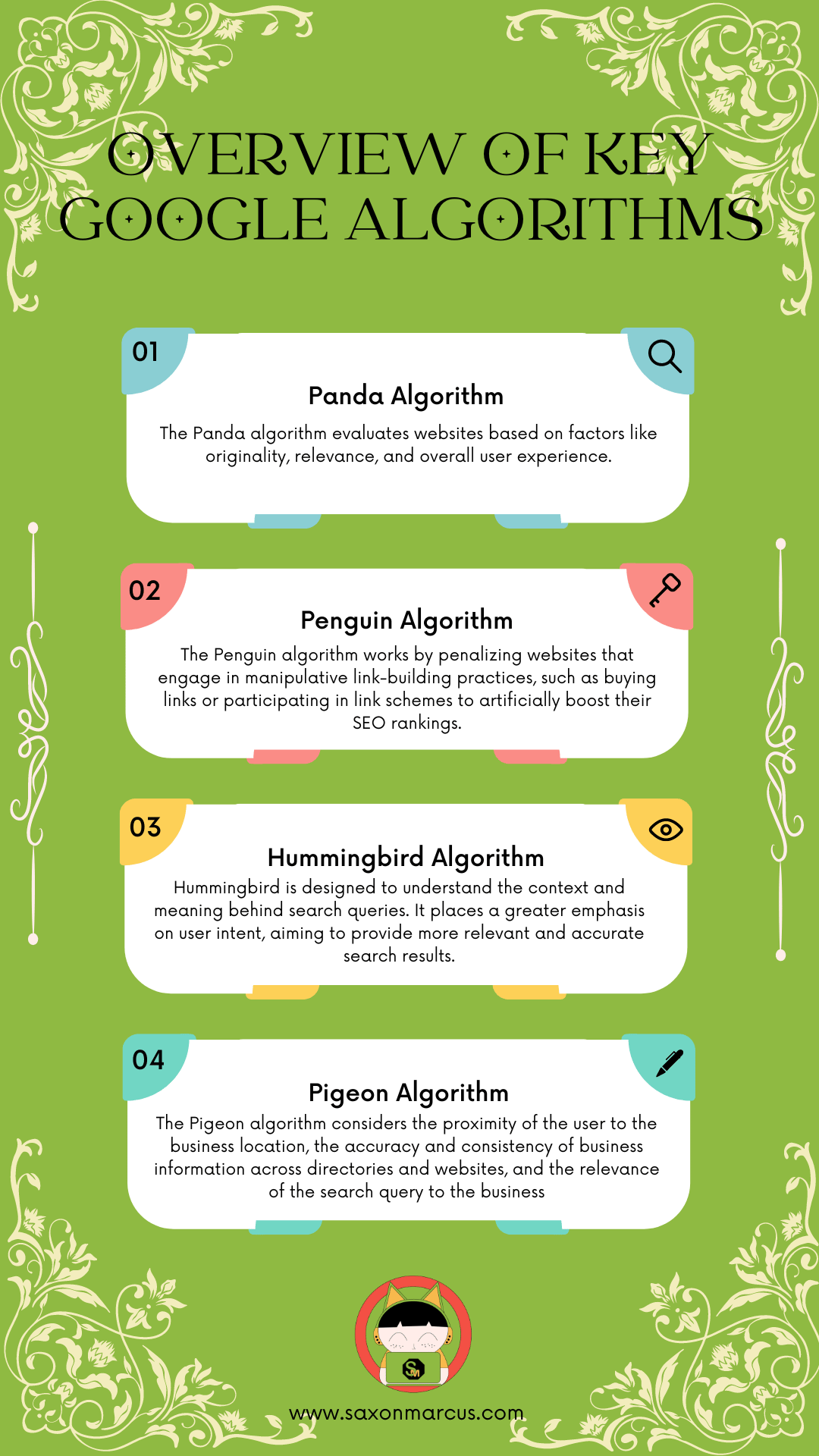
Google’s algorithms are constantly changing, and it’s no secret that they play a major role in website ranking. As a website owner, it’s important to understand how these algorithms work in order to optimize your site and boost your website ranking. With so many factors to consider, decoding Google’s algorithms can seem like a daunting task.
Google’s algorithms and website ranking are at the core of every digital marketer’s strategy. Understanding how Google evaluates and ranks websites is crucial for achieving online success. Google’s algorithms are complex systems designed to analyze and prioritize web pages based on a multitude of factors. These algorithms constantly evolve to deliver the most relevant and high-quality search results to users.
Website ranking refers to the position a website holds in search engine results pages (SERPs) for specific keywords or queries. The goal of every website owner is to secure a high ranking on Google, as it directly impacts visibility, organic traffic, and ultimately, business success.
In this blog post, we will delve into the intricacies of Google’s algorithms and website ranking, unraveling the secrets behind how websites are assessed and ranked on the search engine giant. By gaining insights into these fundamental aspects of online visibility, you will be better equipped to optimize your website and improve its SEO ranking on Google.
THE IMPORTANCE OF KNOWING GOOGLE’S ALGORITHMS FOR WEBSITE RANKING
Google’s algorithms are the key players in determining the website ranking in search engine results pages (SERPs). Understanding the importance of these algorithms is crucial for anyone looking to improve their website’s visibility and attract more organic traffic.
Google uses a complex set of algorithms to analyze and rank websites based on various factors such as relevance, quality of content, user experience, and authority. By decoding these algorithms, website owners and digital marketers can gain valuable insights into what Google values in a website and how to optimize their online presence accordingly.
Knowing how Google’s algorithms work is one of the greatest SEO tools which can help you tailor your SEO strategies to align with the search engine’s guidelines, increasing your chances of SEO ranking higher in SERPs and reaching a wider audience. Stay tuned as we delve deeper into the intricacies of Google’s algorithms and unveil the secrets to boosting your website ranking.
OVERVIEW OF KEY GOOGLE ALGORITHMS
Understanding the key Google algorithms is crucial for anyone looking to improve their website ranking and overall online visibility. These algorithms, such as Panda, Penguin, and Hummingbird, play a significant role in determining how websites are ranked in search engine results pages. Let’s take a closer look at each of these algorithms:
Panda Algorithm: How Does It Work for Website Ranking?
Launched in 2011, Google’s Panda algorithm focuses on the quality of content on websites. It penalizes sites with low-quality, duplicate, or thin content while rewarding those with high-quality, original content that provides value to users.
The Panda algorithm is an essential part of Google’s complex SEO ranking system that focuses on the quality of content on websites. Introduced in 2011, the Panda algorithm aims to lower the rank of low-quality sites while boosting high-quality sites in search results. The Panda algorithm evaluates websites based on factors like originality, relevance, and overall user experience. Websites with thin or duplicate content, keyword stuffing, and poor user engagement metrics are likely to be penalized by Panda.
To ensure your website is not negatively impacted by the Panda algorithm, it is crucial to focus on creating high-quality, unique, and engaging content for your audience. Regularly updating your content, using relevant keywords naturally, and providing valuable information to users are key strategies to improve your website rankings under the Panda algorithm. By understanding how the Panda algorithm works and optimizing your content accordingly, you can enhance your website’s visibility and attract more organic traffic from search engines.
Penguin Algorithm: How Does It Work for Website Ranking?
Introduced in 2012, Penguin targets websites that engage in manipulative link-building practices, such as buying links or participating in link schemes. It aims to ensure that websites rank based on the quality and relevance of their content rather than the quantity of backlinks.
Understanding Google’s algorithms is crucial for website owners and digital marketers looking to improve their website ranking in search engine results. One of Google’s key algorithms is the Penguin algorithm, which focuses on assessing the quality of backlinks pointing to a website.
The Penguin algorithm works by penalizing websites that engage in manipulative link-building practices, such as buying links or participating in link schemes to artificially boost their SEO rankings. It identifies unnatural or spammy backlinks and devalues their impact on a website’s overall SEO ranking.
To ensure compliance with the Penguin algorithm, website owners should focus on building high-quality, relevant backlinks from reputable sources. This can be achieved through creating valuable content that naturally attracts backlinks from authoritative websites within the same industry or niche. Regularly monitoring and auditing your backlink profile is also essential to identify and disavow any harmful links that could negatively impact your website ranking.
By understanding how the Penguin algorithm works and implementing best practices for building a strong backlink profile, website owners can enhance their website’s credibility and visibility in search engine results.
Hummingbird Algorithm: How Does It Work for Website Ranking?
Released in 2013, Hummingbird is a core algorithm update that focuses on understanding the context and intent behind search queries. It enables Google to deliver more relevant search results by considering the meaning of words in a query rather than just matching keywords.
Google’s algorithms play a critical role in determining the SEO ranking of websites in search engine results. One of the key algorithms that website owners need to understand is the Hummingbird algorithm. Launched in 2013, Hummingbird marked a significant shift in how Google interprets search queries and delivers results to users.
Unlike previous algorithms that focused on matching keywords, Hummingbird is designed to understand the context and meaning behind search queries. It places a greater emphasis on user intent, aiming to provide more relevant and accurate search results. This means that websites with high-quality, informative content that addresses users’ needs are more likely to rank well under the Hummingbird algorithm.
Hummingbird achieves this by using natural language processing and semantic search techniques to analyze the entire search query rather than just individual keywords. It looks at the relationships between words in a query to better understand the user’s search intent. By taking a more holistic approach to search, Hummingbird aims to deliver results that are more in line with what users are looking for.
Website owners looking to optimize their sites for the Hummingbird algorithm should focus on creating high-quality, comprehensive content that addresses common user queries. By providing valuable information that matches user intent, websites can increase their chances of ranking well under this algorithm. Understanding how Hummingbird works and aligning your content strategy accordingly can help improve your website’s visibility and performance in search engine results.
Pigeon Algorithm: How Does It Work for Website Ranking?
The Pigeon algorithm is an essential component of Google’s complex SEO ranking system that focuses on local search results. Launched in 2014, the Pigeon algorithm aims to provide more accurate and relevant local search results by incorporating traditional website ranking signals with location-based factors. This algorithm significantly impacts local businesses, as it influences how websites are ranked in local search results.
The Pigeon algorithm considers various factors when determining local SEO rankings, such as the proximity of the user to the business location, the accuracy and consistency of business information across directories and websites, and the relevance of the search query to the business. By understanding how the Pigeon algorithm works, website owners and marketers can optimize their online presence to improve local search visibility and attract more customers within their target geographical area.
In essence, the Pigeon algorithm plays a crucial role in enhancing the user experience by delivering more relevant and geographically targeted search results, ultimately benefiting both businesses and search engine users. Understanding the intricacies of the Pigeon algorithm is key to developing effective local SEO strategies and maximizing online visibility for businesses operating in specific geographical locations.
By gaining a better understanding of these key Google algorithms, website owners and digital marketers can align their SEO strategies to meet the search engine’s guidelines and improve their chances of ranking higher in search results.

FACTORS THAT INFLUENCE WEBSITE RANKING IN GOOGLE SEARCH RESULTS
Google’s algorithms are complex and constantly evolving, making it essential for website owners to stay updated on the key factors that influence their website ranking in search results. Understanding these factors can help optimize your website for better visibility and increased traffic.
One crucial factor is the relevance of your content to the search query. Google prioritizes websites that provide valuable and authoritative information that matches the user’s intent. This emphasizes the importance of creating high-quality, relevant content that addresses users’ needs and queries.
Another significant factor is the user experience on your website. Factors such as page loading speed, mobile-friendliness, and overall usability play a crucial role in determining your website ranking. Google aims to provide users with the best possible experience, so optimizing your website for seamless navigation and accessibility is key.
Backlinks also play a vital role in website ranking. Google considers the quantity and quality of backlinks pointing to your website as a measure of its authority and credibility. Building a strong backlink profile through high-quality and relevant inbound links can significantly boost your website ranking in search results.
Additionally, technical factors such as website security, structured data markup, and optimized meta tags also impact your website ranking. Ensuring that your website meets Google’s technical requirements and guidelines can help improve its visibility in search results.
By understanding and focusing on these key factors that influence website ranking in Google search results, website owners can enhance their SEO strategies and increase their chances of reaching the coveted top positions in search engine results pages.
On-Page Optimization Strategies To Improve Website Ranking
When it comes to improving your website ranking on search engines, on-page optimization is a crucial aspect to focus on. By implementing strategic on-page optimization strategies, you can enhance the visibility and relevance of your website in the eyes of search engines like Google.
One key on-page optimization strategy is optimizing your meta tags, including title tags, meta descriptions, and heading tags. These tags provide search engines with valuable information about the content of your web pages, helping them understand what your site is about and how it should be indexed.
Additionally, optimizing your website’s content is essential for improving its keyword ranking. This includes creating high-quality, relevant, and engaging content that incorporates targeted keywords naturally. By focusing on user intent and providing valuable information, you can attract more organic traffic to your site and improve its SEO ranking.
Furthermore, optimizing your website’s URL structure, internal linking, and image optimization are all important on-page factors that can positively impact your website ranking. By paying attention to these details and implementing effective on-page optimization strategies, you can boost your website’s visibility and climb higher in search engine results pages.
Off-Page Optimization Techniques For Boosting Website Ranking and Visibility
Off-page optimization plays a crucial role in boosting your website’s visibility and keyword ranking on search engine results pages. These techniques focus on improving your site’s credibility, authority, and relevance across the web. One of the most powerful off-page optimization strategies is building high-quality backlinks from reputable and relevant websites. Backlinks signal to search engines that your website is trustworthy and valuable, ultimately helping to improve your ranking.
Another effective off-page optimization technique is social media marketing. Engaging with your audience on platforms like Facebook, Twitter, and Instagram not only drives traffic to your site but also enhances your brand’s online presence. Social signals, such as likes, shares, and comments, can positively impact your website’s visibility in search results.
Furthermore, online reviews and citations from reputable sources can boost your website’s credibility and authority. Encouraging satisfied customers to leave positive reviews and ensuring your business information is consistent across online directories can improve your site’s reputation in the eyes of both users and search engines.
By implementing a well-rounded off-page optimization strategy that focuses on building quality backlinks, engaging on social media, and managing online reviews, you can enhance your website’s visibility and climb the SEO rankings.
Mobile-Friendliness And Website Ranking
Ensuring that your website is mobile-friendly is no longer just a recommendation; it’s a necessity in today’s digital landscape. With the increasing number of users accessing the internet through their smartphones and tablets, Google has placed significant importance on mobile-friendliness when determining website rankings.
A mobile-friendly website not only provides a better user experience for visitors but also signals to search engines that your site is responsive and adaptable to different screen sizes. This, in turn, can positively impact your website ranking in search engine results pages.
To optimize your website for mobile devices, consider implementing responsive design, which automatically adjusts the layout and content based on the screen size. Additionally, ensure that your site loads quickly on mobile devices, as page speed is another crucial factor in Google’s ranking algorithm.
By prioritizing mobile-friendliness in your website design and development efforts, you can improve your chances of ranking higher in search results and reaching a broader audience of mobile users.
Local Seo And Its Impact On Website Ranking
Local SEO plays a crucial role in determining the online visibility and ranking of your website. With the increasing trend of personalized search results, optimizing your website for local searches has become more important than ever. Google’s algorithms are designed to deliver relevant and geographically specific results to users, making local SEO a powerful tool for businesses looking to attract nearby customers.
One of the key factors that influence local SEO is the consistency of your business information across all online platforms. This includes your business name, address, phone number, and website URL. Ensuring that this information is accurate and up-to-date not only helps users find your business easily but also signals credibility to search engines.
Another important aspect of local SEO is optimizing your website content with local keywords and location-specific information. By including relevant keywords such as city names, neighborhoods, and landmarks in your content, you can improve your chances of ranking higher in local search results.
Furthermore, claiming and optimizing your Google My Business listing is essential for local SEO success. This free tool allows you to manage how your business appears on Google Search and Maps, providing valuable information to potential customers such as your business hours, photos, and customer reviews.
In conclusion, incorporating local SEO strategies into your website optimization efforts can have a significant impact on your online visibility and website ranking. By focusing on local search optimization, you can better reach and engage with your target audience, ultimately driving more traffic and conversions to your website.
Disputed Website Ranking Factors
While Google has revealed some ranking factors that are known to influence search results, there are also disputed ranking factors that have sparked debates within the SEO community. One such disputed factor is the importance of social signals, such as likes, shares, and comments on social media platforms.
Some experts believe that social signals play a significant role in determining a website ranking, while others argue that these signals have minimal impact on search results.
Another disputed ranking factor is the significance of domain age. Some SEO professionals claim that older domains are given preference by Google, while others argue that domain age is just one of many factors considered in the ranking algorithm.
As Google continues to refine its algorithms, it is essential for website owners and SEO practitioners to stay informed about both confirmed and disputed ranking factors to optimize their websites effectively.
THE ROLE OF QUALITY CONTENT IN GOOGLE’S ALGORITHMS
Quality content plays a crucial role in Google’s algorithms and is a key factor in determining a website ranking in search results. Google indexes pages. Google determines what the page is about and whether or not it is unique and high quality. Not every page will be indexed.
Google prioritizes websites that offer valuable, relevant, and engaging content to users. This means that creating high-quality content that meets the needs and interests of your target audience is essential for improving your website’s visibility in search engine results.
When it comes to content, Google looks for various signals to determine its quality. These signals include relevance, originality, depth, and usefulness. Content that is well-written, informative, and authoritative tends to perform well in SEO rankings. It’s important to focus on creating content that addresses the questions and concerns of your audience, provides valuable insights, and offers a unique perspective on the topic.
In addition to textual content, other types of content such as images, videos, infographics, and interactive elements can also enhance the user experience and improve your website’s search visibility. By investing time and effort into creating high-quality content that resonates with your target audience, you can not only improve your website ranking in search results but also build credibility, authority, and trust with your users.
TIPS FOR STAYING UPDATED WITH GOOGLE’S ALGORITHM CHANGES
Staying updated with Google’s algorithm changes is crucial for maintaining and improving your website ranking. Google frequently updates its algorithms to provide users with the most relevant and high-quality search results. To ensure that your website remains optimized for these changes, here are some tips to keep in mind:
Follow Google’s Official Channels
Google often announces major algorithm updates through its official channels such as the Google Webmaster Central Blog and Google SearchLiaison Twitter account. By following these channels, you can stay informed about upcoming changes and how they may impact your website.
Sign Up For Google Search Console
Google Search Console is a free tool that provides valuable insights into your website’s performance in Google search results. By monitoring your website through Search Console, you can receive alerts about any issues that may affect your rankings and stay informed about algorithm updates.
Stay Engaged in Seo Communities
Joining SEO communities and forums can help you stay updated on the latest algorithm changes and industry trends. Engaging with other SEO professionals can provide valuable insights and strategies for adapting to Google’s updates.
Monitor Industry News and Blogs
Stay informed by regularly reading reputable SEO blogs and industry news websites. Many SEO experts share their insights and analysis of Google’s algorithm changes, which can help you understand how to adjust your SEO strategies accordingly.
Experiment and Test
As Google continues to refine its algorithms, it’s important to experiment with different SEO tactics and test their impact on your website rankings. By staying proactive and adaptive, you can better position your website for success in the ever-evolving landscape of search engine optimization.
By following these tips and staying proactive in monitoring Google’s algorithm changes, you can adapt your what is SEO strategies effectively and continue to improve your website ranking in search results.
What to Do if Your Website Was Affected by an Algorithm Update
If your website has been affected by a Google algorithm update, it can be a stressful and confusing time. However, there are steps you can take to recover and improve your website ranking.
First, it’s essential to analyze the impact of the algorithm update on your website. Identify which specific aspects of your website were affected, such as content quality, backlinks, or user experience.
Once you have identified the issues, work on improving them to align with Google’s updated ranking criteria. This may involve updating your content, disavowing toxic backlinks, or enhancing your website’s usability.
Additionally, staying informed about Google’s algorithm updates and best practices in SEO is crucial to maintaining and improving your website ranking. Keep an eye on industry news and Google’s official communications to understand upcoming changes and adapt your strategies accordingly.
Finally, if you are unsure how to proceed or need additional help, consider consulting with SEO experts or SEO digital marketing agencies that specialize in algorithm recovery. By taking proactive steps and staying informed, you can navigate algorithm updates and ensure your website’s long-term success in search engine rankings.

CONCLUSION
Google’s algorithms are the key to unlocking success in the digital world. They determine where your website ranks in search engine results, ultimately influencing the visibility and success of your online presence. Understanding these complex algorithms is crucial for anyone looking to optimize their website and improve their keyword ranking.
Google’s ranking process is a complex algorithm that takes into account numerous factors to determine where a website should appear in search results. One of the key components of Google’s ranking process is relevance. Google aims to deliver the most relevant and useful results to its users, so it considers factors such as keywords, content quality, and user experience when determining a website ranking.
Another crucial element is authority. Google looks at the credibility and trustworthiness of a website, considering factors like backlinks, domain age, and social signals to assess a site’s authority. Additionally, user experience plays a significant role in Google’s ranking process.
Factors like page load speed, mobile-friendliness, and overall site usability can impact where a website ranks in search results. By understanding Google’s ranking process and optimizing your website accordingly, you can improve your chances of appearing higher in search results and driving more organic traffic to your site. Some key ranking factors that play a significant role in Google’s algorithms include:
1. Content Quality: High-quality, relevant, and original content is essential for ranking well in Google search results. Content should be well-written, informative, and engaging to provide value to users.
2. Backlinks: Backlinks from authoritative and relevant websites can significantly impact a website ranking. Quality backlinks act as a vote of confidence for your website’s credibility and authority.
3. Mobile-Friendliness: With the increasing use of mobile devices, Google prioritizes websites that are mobile-friendly and provide a seamless user experience across all devices.
4. Page Speed: Website loading speed is a crucial ranking factor as Google aims to provide users with fast and efficient search results. Slow-loading websites may experience lower rankings in search results.
5. On-Page Optimization: Optimizing on-page elements such as title tags, meta descriptions, headings, and image alt text with relevant keywords can help improve a website’s visibility in search results.
By focusing on these key ranking factors and continually monitoring and optimizing your website, you can improve your chances of ranking higher in Google search results and driving more organic traffic to your website.



